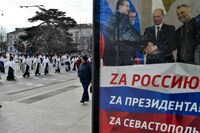
The $47.3 billion deficit contrasted sharply with a budget surplus of $6.7 billion in 2021. The only year Russia experienced a larger deficit was in 2020 during the covid pandemic, when it hit 4.1 trillion rubles, or $55 billion at the time.
According to additional Finance Ministry figures published by Russian business newspaper RBC, Russia’s annual budget expenditure also shot up by nearly 26 percent in 2022, apparently driven by military costs.
The figures provide Russia’s own sobering measure of the economic costs of President Vladimir Putin’s decision to invade Ukraine, which the Kremlin has sought to minimize. The costs, in blood and gold, are mounting, and are expected to rise even further in 2023.
According to RBC, military spending is expected to jump in 2023, by nearly 5 trillion rubles, or $71 billion, as Moscow tries to counter the weapons being donated to Ukraine by the United States and Kyiv’s other Western supporters.
Russian spending on security and law enforcement is expected to soar by nearly the same amount, RBC reported, possibly signaling the Kremlin’s concern that the war could stir popular unrest.
Russia’s military has stumbled badly since the start of the invasion last February, failing first in its bid to seize Kyiv, the capital, in the spring, and then being pushed into humiliating retreats in the northeast Kharkiv and southern Kherson regions in the fall.
The Kremlin, running short on materiel, has been purchasing drones from Iran, and was forced to impose a partial mobilization to make up for steep casualties on the battlefield. In response, hundreds of thousands of men fled the country to avoid being conscripted into the war, further denting the economy.
On Tuesday, however, Russia appeared close to making one of its first concrete military gains in months, as its forces appeared to be nearing control of the town of Soledar, a gateway to the city of Bakhmut, which has been the focus of some of the war’s bloodiest battles in recent weeks in the eastern Donetsk region.
The Russian government had reportedly sought to tackle its ballooning budget deficit last year by dipping into savings in Russia’s National Welfare Fund, as well as by levying windfall taxes on Gazprom, the state-controlled Russian energy company.
The new figures were unveiled Tuesday amid reports that Moscow is planning a “revenue mobilization” and may press Russian state companies and commodity producers for more money to fund the war efforts, including a proposal to impose “one-time” charges on fertilizer and coal producers.
Additional signs of economic turmoil were apparent in a new report that sales by AvtoVAZ, the Russian auto manufacturer that produces the iconic Lada, had decreased by 46 percent compared with 2021.
The economic woes were just one indication of the fallout from the war. In a further sign of the disruption to political and cultural life in Russia, the first criminal case was announced against an independent Russian publishing house under a recently expanded law prohibiting LGBTQ “propaganda.”
The law, passed in December, built on existing legislation targeting the LGBTQ community and prohibited the “promotion” or “praising” of LGBTQ people and relationships in books, film and advertising.
Alexander Khinshtein, a member of the State Duma, Russia’s lower house of parliament, announced that a case was initiated against Popcorn Books, a publisher that has openly supported LGBTQ rights in Russia.
“I hope that the case will be brought to court and that Popcorn Books, which has openly challenged the state, will get what it deserves,” Khinshtein wrote on the Telegram messaging channel.
“This publishing house is one of the flagships for promoting LGBT literature in Russia,” he continued. “LGBT propaganda Popcorn Books not only continued to sell such books, but defiantly began to decorate their covers with quotes from Article 29 of the constitution, which guarantees freedom of speech and prohibition of censorship.”
Popcorn Books published a novel in 2021 about the relationship between two teenage boys at a Soviet summer camp, titled “Summer in a Pioneer Tie,” which became a hit, reportedly selling 200,000 copies in the first six months of its release.
In 2020, Popcorn Books co-founder Tata Anastasian said in an interview that it was the first Russian publishing house to promote LGBTQ literature.
“I believe that every area of culture needs people who can take those small but difficult steps forward in order to change the future of their country,” Anastasian said at the time. “Our goal is not just to give people the pleasure of reading, but also to help them cope with life’s difficulties, to accept themselves and others.”
Since the start of the invasion, the Russian government has hardened allegiance to what it calls “traditional family values” and has bound itself tightly to the Orthodox Church, which came out strongly in favor of the war in Ukraine. Already vulnerable LGBTQ communities are now even more marginalized.
Critics of the war, and political opposition figures in general, have come under severe persecution amid the wartime fervor, though the Kremlin has been working to crush political dissent for years.
On Tuesday, a group of Russian doctors published an open letter addressed to Putin, imploring him to stop “torturing” Russian opposition leader Alexei Navalny — who has been imprisoned since he returned to Russia after recovering in Germany from a 2020 assassination attempt with a nerve agent.
According to his supporters, Navalny spent 15 days in solitary confinement over the New Year’s holidays.
“We demand an end to the abuse of Alexei Navalny, we demand to stop sending Alexei to the punishment cell, we demand that civilian doctors be allowed to see him and, if needed, that he be hospitalized in a civilian hospital for full examination and treatment,” read the letter, which was initially signed by more than 20 doctors.
The letter followed a post published Monday on Navalny’s social media channels that detailed his recent experience in solitary confinement. Prominent Russian bloggers and journalists have since also joined the plea, asking their readers to sign the letter.
One Russian journalist, Alexander Plushev, wrote on Telegram: “If there are brave doctors among my readers, they too can sign the appeal of their colleagues demanding an end to the abuse of Alexei Navalny.”







